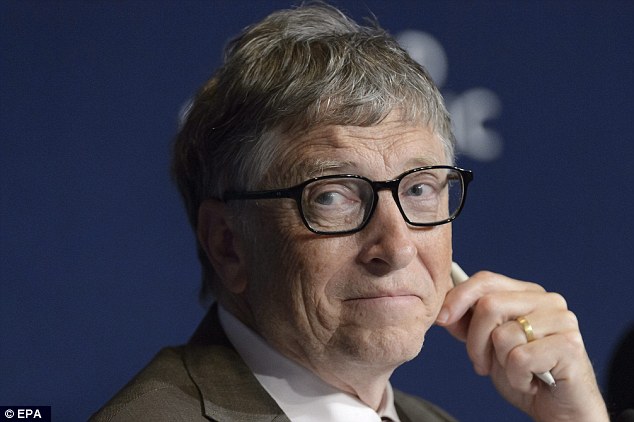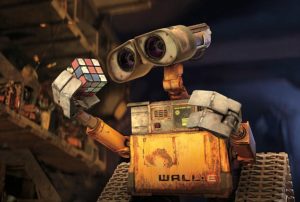Claims in next 10 years there will be robots to do tasks like driving and warehouse for humans AI will also outpace humans in certain areas of
- Claims in next 10 years there will be robots to do tasks like driving and warehouse for humans
- AI will also outpace humans in certain areas of knowledge

‘The dream is finally arriving,’ Gates said, speaking with wife Melinda Gates on Wednesday at the Code Conference in Southern California.
‘This is what it was all leading up to.’
Gates said enough progress has been made to ensure that in the next 10 years there will be robots to do tasks like driving and warehouse work as well as machines that can outpace humans in certain areas of knowledge, according to recode.
He also suggested a pair of books that people should read, including Nick Bostrom’s book on superintelligence and Pedro Domingos’ ‘The Master Algorithm.’
Previously he has warned the risk of artificial intelligence software becoming super smart is ‘way out in the future,’
In the next 10 to 20 years, AI is going to be ‘extremely helpful’ in managing our lives, Gates told CNBC in a ‘Squawk Box’ interview earlier this year.
Gates said what he called ‘alter-ego software’ is going to deal with day to day emails and other correspondence.
‘It will look at all the new information and present to you, knowing about your interests, what would be most valuable,’ he predicted, saying Microsoft along with the Google unit Alphabet, Facebook and Apple are making great strides in artificial intelligence.
In a separate claim while taking part in an Ask Me Anything (AMA) Q&A session on Reddit, Gates said he had doubts: ‘I am in the camp that is concerned about super intelligence.
‘First the machines will do a lot of jobs for us and not be super intelligent.
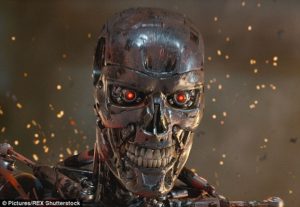
That should be positive if we manage it well.
‘A few decades after that though the intelligence is strong enough to be a concern.
‘I agree with Elon Musk and some others on this and don’t understand why some people are not concerned.’
So it is perhaps not surprising there are now growing fears among the public about the threat posed by artificial intelligence.
A new survey has revealed that one in three people now believe the rise of AI computing will pose a serious threat to humanity within the next century.
That should be positive if we manage it well.
‘A few decades after that though the intelligence is strong enough to be a concern.
‘I agree with Elon Musk and some others on this and don’t understand why some people are not concerned.’
So it is perhaps not surprising there are now growing fears among the public about the threat posed by artificial intelligence.
A new survey has revealed that one in three people now believe the rise of AI computing will pose a serious threat to humanity within the next century.
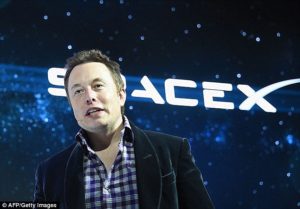
That should be positive if we manage it well.
‘A few decades after that though the intelligence is strong enough to be a concern.
‘I agree with Elon Musk and some others on this and don’t understand why some people are not concerned.’
So it is perhaps not surprising there are now growing fears among the public about the threat posed by artificial intelligence.
A new survey has revealed that one in three people now believe the rise of AI computing will pose a serious threat to humanity within the next century.
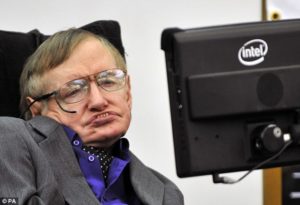
Both Elon Musk and Stephen Hawking have been outspoken about their fears of artificially intelligent machines.
The SpaceX and Tesla CEO last year described AI as our ‘biggest existential threat’ and likened its development as ‘summoning the demon.’
He believes super intelligent machines could use humans as pets.
Professor Hawking has recently said it is a ‘near certainty’ that a major technological disaster will threaten humanity in the next 1,000 to 10,000 years.
The survey found that women fear the rise of AI machines more than men, with just 17 per cent of women claiming to feel optimistic about the technology, compared with 28 per cent of men.
Some 13 per cent of men can imagine themselves becoming friends with a robot, compared to just six per cent of women.
Lord Willets said: ‘People will always want human experiences – robots will not kill the radio star, and we will always want to interact with other people.
‘In fact, the greater problem is that artificial intelligence cannot quickly enough fill jobs that are going spare.’
Young people, between the ages of 18 and 24 are the most open minded about a future filled with AI machines, with one in four envisaging having robotic so-workers and 10 per cent even open to welcoming them as family members.
More than half of this age bracket – 55 per cent- also said that intelligent machines could take up the role of servants in a household.

